|
|
|
Sort Order |
|
|
|
Items / Page
|
|
|
|
|
|
|
| Srl | Item |
| 1 |
ID:
114095
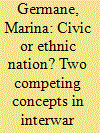

|
|
|
|
|
| Publication |
2012.
|
| Summary/Abstract |
This article examines the historical development of the two different concepts of the Latvian nation: the one that included the equal participation of all ethnic groups residing in Latvia, and the one that put them at the margins of the new state. In 1919, citizenship was granted to all Latvian residents irrespective of their ethnicity, while the Law on Minorities' Schools established a framework for cultural autonomy. National unity was perceived as being crucial to state independence, and remained central to political debates in the first republic. However, similarly to elsewhere in Central and Eastern Europe, the creation of the political nation faced a number of serious domestic and international challenges. The worldwide economic depression and the parliamentary crisis of the 1930s finally tipped the scale in favour of the ethnic version of the Latvian nation. Nevertheless, even seventy years later, the brave multicultural experiment in this small Baltic country resonates with modern debates on nation-building and minority rights.
|
|
|
|
|
|
|
|
|
|
|
|
|
|
|
|
| 2 |
ID:
115228
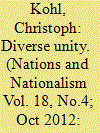

|
|
|
|
|
| Publication |
2012.
|
| Summary/Abstract |
The paper explores how creole categories of people who have constituted a small but influential minority in Guinea-Bissau for centuries contributed to a countrywide, integrated national culture since the eve of independence in 1974. Since independence, several cultural representations previously exclusive to creole communities have been - driven by the nationalist independence movement and the early postcolonial state - transformed into representations of a new national culture, crossing ethnic and religious boundaries. The fact that creole identity and culture had been transethnic - i.e. creole identity brings together individuals of heterogeneous cultural, ethnic and geographic descent - during the colonial period, has fostered in postcolonial times the countrywide spread of previously exclusively creole cultural features. I argue that this 'transethnicisation' of creole cultural representations has unified Bissau-Guineans across ethnic lines, causing a strong commitment with their nation 'from below'.
|
|
|
|
|
|
|
|
|
|
|
|
|
|
|
|
| 3 |
ID:
073298
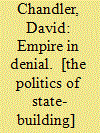

|
|
|
|
|
| Publication |
London, Pluto Press, 2006.
|
| Description |
xii, 221p.
|
| Standard Number |
0745324282
|
|
|
|
|
|
|
|
|
|
|
|
Copies: C:1/I:0,R:0,Q:0
Circulation
| Accession# | Call# | Current Location | Status | Policy | Location |
| 051576 | 327.11/CHA 051576 | Main | On Shelf | General | |
|
|
|
|
| 4 |
ID:
080262
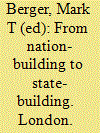

|
|
|
|
|
| Publication |
London, Routledge, 2008.
|
| Description |
ix, 211p.
|
| Standard Number |
9780415413787
|
|
|
|
|
|
|
|
|
|
|
|
Copies: C:1/I:0,R:0,Q:0
Circulation
| Accession# | Call# | Current Location | Status | Policy | Location |
| 053022 | 327.17/BER 053022 | Main | On Shelf | General | |
|
|
|
|
| 5 |
ID:
114666
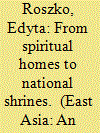

|
|
|
|
|
| Publication |
2012.
|
| Summary/Abstract |
As in China and Soviet Russia, religion in Vietnam was considered to be
harmful superstition. However, a glimpse into the Governmental Gazette - Công
Báo - displays the important transformation of the state's policy toward religion that
became translated into national representation. While this article focuses on nationbuilding as a dynamic cultural process that leads to the promotion of selected
religious practices as 'national heritage,' it also explores the state-society
relationship beyond binaries. By looking at religious spaces and local communities
I argue that in Vietnam religion is a powerful form of nation-building process and
constitutes a creative space in which different actors exercise their agency beyond
resistance and accommodation.
|
|
|
|
|
|
|
|
|
|
|
|
|
|
|
|
| 6 |
ID:
116598
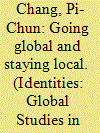

|
|
|
|
|
| Publication |
2012.
|
| Summary/Abstract |
Utilizing the 'Singapore Story', this study will explore cultural policies implemented and aimed towards cosmopolitanism, and how these policies have affected the international arts scene, which has led to a polarization within the community by excluding the elderly and disadvantaged members of the population from participating. Singapore's cultural policy has served the function of nation-building and at the same time goes with globalisation and thus calls for constructing a cosmopolitan yet patriotic citizen in terms of identity. This article considers the role of nationalism as a guide to the understanding of cultural policy discourses and argues that a top-down cosmopolitan construction of national identity in cultural policy discourses lacks representation of people's daily life.
|
|
|
|
|
|
|
|
|
|
|
|
|
|
|
|
| 7 |
ID:
095096
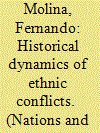

|
|
|
|
|
| Publication |
2010.
|
| Summary/Abstract |
All the historical moments in which the Basque debate reached political protagonism in contemporary Spain coincided with political contexts of institutional democratisation. The debate on patriotism in the Basque Country is connected with a uniform narrative regarding the Basques and their moral distance from the Spanish nation: the 'Basque problem'. This narrative has fostered a confrontational discourse between Spanish and Basque nationalism. It has also promoted recourse to specific stereotypical images of the Basques, which bind ethnicity to collective identity. Such representations reveal that the invention of the Basque country as a uniform ethnic collective had much more to do with the internal contradictions of Spanish national identity - and later of Basque identity - than with the existence of a secular conflict between Basques and Spaniards. The Basque case shows that every 'ethnic conflict' requires adequate contextualisation in order to avoid simplifying its origins and past pathways to make it conform to present uses.
|
|
|
|
|
|
|
|
|
|
|
|
|
|
|
|
| 8 |
ID:
172223
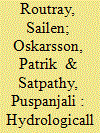

|
|
|
|
|
| Summary/Abstract |
This article analyses how long-running, multilayered conflicts over water at the Hirakud dam underpin present-day societal divisions in Odisha state. There are four unresolved conflicts over this dam in the state: movements against displacement, movements for rehabilitation, struggles between agricultural and industrial water users, and, finally, disputes between federal states. These have generated societal ruptures from the announcement of the dam in 1946 to the present day. We argue that understanding the confluence and ingrained, overlapping character of these conflicts provide important vantage points for understanding the present uneasy constitution of subregional state fabrication in Odisha.
|
|
|
|
|
|
|
|
|
|
|
|
|
|
|
|
| 9 |
ID:
115231
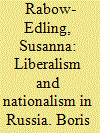

|
|
|
|
|
| Publication |
2012.
|
| Summary/Abstract |
This article investigates the link between nationalism and liberalism in Russia by looking at the way the leading spokesman of early Russian liberalism, Boris Chicherin, combined liberal ideas with notions of nation-building and the idea of the nation as a modernising phenomenon. The article argues that the young Chicherin, at least in the formative years of the 1850s, had an instrumental approach to liberalism. Liberalism served a specific purpose - to integrate the people and shape a community of active citizens so that Russia could modernise. Chicherin was concerned with the formation of a modern nation-state rather than the establishment of popular rule or political rights. In this sense, his thinking fits well into what, in the context of the Ottoman Empire, has been called modernist nationalism.
|
|
|
|
|
|
|
|
|
|
|
|
|
|
|
|
| 10 |
ID:
120368
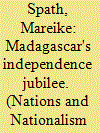

|
|
|
|
|
| Publication |
2013.
|
| Summary/Abstract |
The fiftieth anniversary of Madagascar's independence in 2010 took place in the midst of political crisis. The transitory government staged large public parties to mark the Jubilee. Despite a public discussion about legitimacy and justification of this fact, the national holiday was lavishly celebrated. In Madagascar, Independence Day is also an important family event and emphasis was put on private celebrations including family feasts and reunions. As a result, it enhanced the participants' emotional attachment to their personal and local face-to-face milieu. This article asks how the golden jubilee was celebrated against a backdrop of political illegitimacy. I contrast official state-led initiatives and individual agency in the private sphere and discuss how the national holiday has been appropriated and reinterpreted by the population as a family and community holiday. This article is based on qualitative ethnographical fieldwork in Antananarivo before, during and after the peak of the independence jubilee.
|
|
|
|
|
|
|
|
|
|
|
|
|
|
|
|
| 11 |
ID:
074248
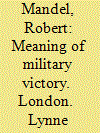

|
|
|
|
|
| Publication |
London, Lynne Rienner Publisher, 2006.
|
| Description |
x, 190p.
|
| Standard Number |
1588264238
|
|
|
|
|
|
|
|
|
|
|
|
Copies: C:1/I:0,R:0,Q:0
Circulation
| Accession# | Call# | Current Location | Status | Policy | Location |
| 051761 | 355.4/MAN 051761 | Main | On Shelf | General | |
|
|
|
|
| 12 |
ID:
184905
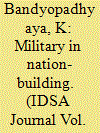

|
|
|
| 13 |
ID:
178460
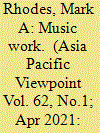

|
|
|
|
|
| Summary/Abstract |
Recent scholarship has opened questions as to the everyday actions of the Khmer Rouge and those living under the regime which led to the Cambodian Genocide. Current work examines the critical cultural geographies of the Khmer Rouge: photography, poetry and music, for example. Music specifically has an interesting underpinning, as it was previously understood to be have been eradicated in the genocide as the standard narrative has us believe. This paper instead investigates the pieces of evidence that exist, which explain the use of music by the Khmer Rouge. I explore the geographies of music beyond the lyrics and look at the transformation and use of music in Cambodia and Democratic Kampuchea. What elements of traditional Khmer music were used during the regime? What modifications occurred to the music of Cambodia during the regime, and how did the Khmer Rouge modify existing Cambodian (and other) music to best fit their desired uses (state-building and genocide)? This paper goes beyond traditional geographies of music, which rely on lyrical analyses, to bring an ethnomusicological perspective to the work of music and its role in shaping the idea of the Democratic Republic of Kampuchea.
|
|
|
|
|
|
|
|
|
|
|
|
|
|
|
|
| 14 |
ID:
114664
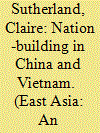

|
|
|
|
|
| Publication |
2012.
|
| Summary/Abstract |
This introduction explores the changing nature of Chinese and Vietnamese
nation-building in the era of globalisation and specifically, transnationalism. The first
part sets out a conceptual framework designed to put contemporary Chinese and
Vietnamese nation-building in comparative, international perspective. The second
part looks at the borders of nation-building from the point of view of diasporas
living the nation-state, while the third part focuses on a series of trends working to
reinterpret the nation from within.
|
|
|
|
|
|
|
|
|
|
|
|
|
|
|
|
| 15 |
ID:
140172
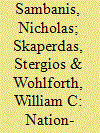

|
|
|
|
|
| Summary/Abstract |
How do the outcomes of international wars affect domestic social change? In turn, how do changing patterns of social identification and domestic conflict affect a nation’s military capability? We propose a “second image reversed” theory of war that links structural variables, power politics, and the individuals that constitute states. Drawing on experimental results in social psychology, we recapture a lost building block of the classical realist theory of statecraft: the connections between the outcomes of international wars, patterns of social identification and domestic conflict, and the nation’s future war-fighting capability. When interstate war can significantly increase a state’s international status, peace is less likely to prevail in equilibrium because, by winning a war and raising the nation’s status, leaders induce individuals to identify nationally, thereby reducing internal conflict by increasing investments in state capacity. In certain settings, it is only through the anticipated social change that victory can generate that leaders can unify their nation, and the higher anticipated payoffs to national unification makes leaders fight international wars that they would otherwise choose not to fight. We use the case of German unification after the Franco-Prussian war to demonstrate the model’s value-added and illustrate the interaction between social identification, nationalism, state-building, and the power politics of interstate war.
|
|
|
|
|
|
|
|
|
|
|
|
|
|
|
|
| 16 |
ID:
122816
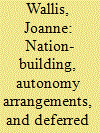

|
|
|
|
|
| Publication |
2013.
|
| Summary/Abstract |
After a protracted war of secession in 2001, the Bougainville region of Papua New Guinea was granted autonomy and deferred a referendum on its political future. This article argues that the Bougainville case highlights the challenges posed by attempts to settle self-determination disputes using these tools. It considers the challenges posed by deferred referendums, principally how to reconcile competing interpretations of the identity and future political status of the region. It also considers the challenges posed by attempts to negotiate the relationship between the unique identities of autonomous regions and their identities within the larger state.
|
|
|
|
|
|
|
|
|
|
|
|
|
|
|
|
| 17 |
ID:
114923
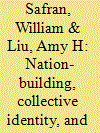

|
|
|
|
|
| Publication |
2012.
|
| Summary/Abstract |
The discussion of the place of language in politics has generally revolved around its relationship to nation-building and ethnic conflict. Yet, these are not always causally connected nor is language easily given up for the sake of a greater national or individual good. Attitudes regarding language can be influenced by anticolonialist resentments, memories of past injustice, status paranoia, xenophobia, collective megalomania, religion, ideology, and the desire on the part of a group to base its collective identity on a demarcation from a real or imagined enemy. This applies to many dimensions of language policies, including officialization, alphabetization, gentrification, and glossonym changes. We argue that governments choose language policies for strategic reasons. Whether it is to legitimize or subordinate a language or whether or not the policy is itself the objective, these choices may have unintended consequences.
|
|
|
|
|
|
|
|
|
|
|
|
|
|
|
|
| 18 |
ID:
099145
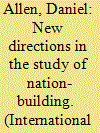

|
|
|
|
|
| Publication |
2010.
|
| Summary/Abstract |
The topic of nation-building is of enormous significance to both scholars and policymakers. Path dependence, a key theory of historical institutionalism, yields a great deal of insights into the extent to which conditions are favorable for outside actors to impose an institutional framework on a given society. Path dependence reveals several important variables that should be considered carefully in nation-building research. These variables include the effects of conflict on an occupied society, surviving institutions drawn upon by an occupier undertaking a policy of imposed nation-building, and the presence of a clear, salient national identity among the occupied society. This essay explores these variables with respect to four cases of outside-imposed nation-building to show the clearly divergent outcomes and their relationship to the variables of concern to a path dependence approach to the concept. Conclusions here are firmly in line with critiques of liberal peacebuilding as a universal template for imposed development.
|
|
|
|
|
|
|
|
|
|
|
|
|
|
|
|
| 19 |
ID:
139472
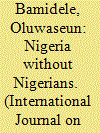

|
|
|
|
|
| Summary/Abstract |
This paper explores the processes of identity-making and nation-building in a multi-ethnic, multi recently facing a protracted armed struggle against ultra-militant and sub-ethnic groups.
|
|
|
|
|
|
|
|
|
|
|
|
|
|
|
|
| 20 |
ID:
118353
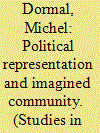

|
|
|
|
|
| Publication |
2012.
|
| Summary/Abstract |
Discussions of nation-building often focus on political elites, who are considered the makers of new communities. This article seeks to sketch out a different approach. It suggests thinking of representative relations as the site of a negotiation of collective identity. Drawing on recent discussions in political theory, the first part of the article discusses conceptual implications of this assumption, arguing that representation should be analysed in terms of its symbolic structure. The second part offers a historical case study of the Grand-Duchy of Luxembourg. It explores how processes of political democratisation and imagination of national community were deeply interconnected in the period from 1890 to 1939. The article illustrates how the representative politisation of social conflict may trigger nation-building.
|
|
|
|
|
|
|
|
|
|
|
|
|
|
|
|
|
|
|
|
|